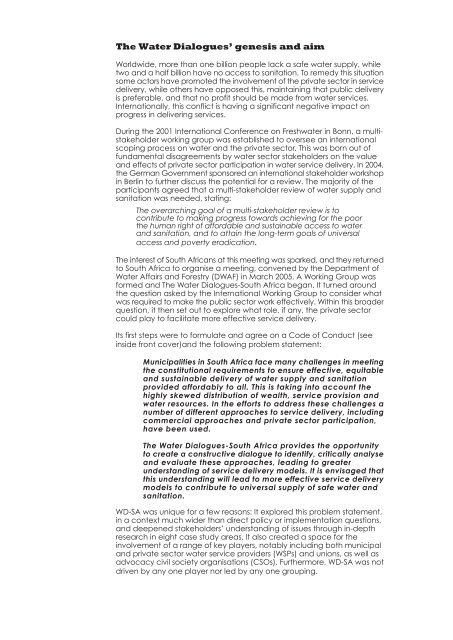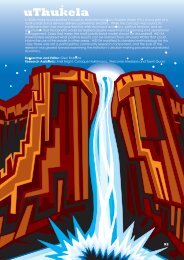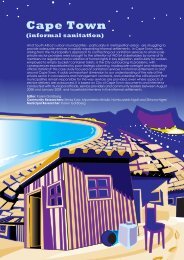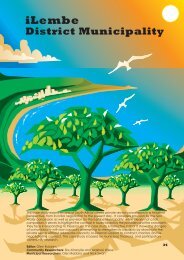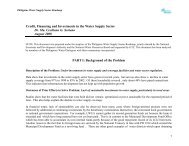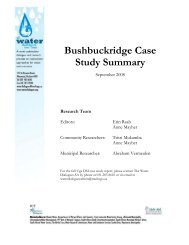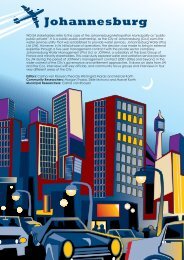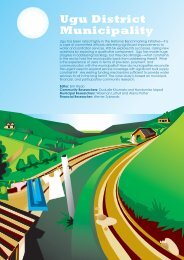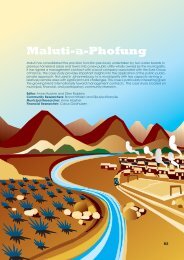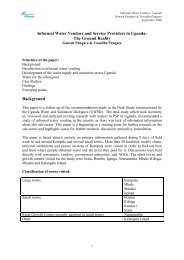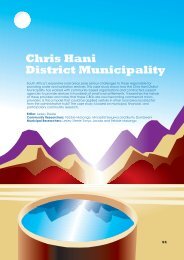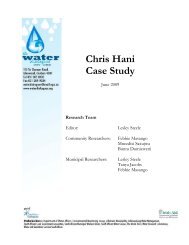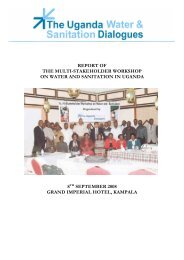Report Back Cover - The Water Dialogues
Report Back Cover - The Water Dialogues
Report Back Cover - The Water Dialogues
You also want an ePaper? Increase the reach of your titles
YUMPU automatically turns print PDFs into web optimized ePapers that Google loves.
<strong>The</strong> <strong>Water</strong> <strong>Dialogues</strong>’ genesis and aimWorldwide, more than one billion people lack a safe water supply, whiletwo and a half billion have no access to sanitation. To remedy this situationsome actors have promoted the involvement of the private sector in servicedelivery, while others have opposed this, maintaining that public deliveryis preferable, and that no profit should be made from water services.Internationally, this conflict is having a significant negative impact onprogress in delivering services.During the 2001 International Conference on Freshwater in Bonn, a multistakeholderworking group was established to oversee an internationalscoping process on water and the private sector. This was born out offundamental disagreements by water sector stakeholders on the valueand effects of private sector participation in water service delivery. In 2004,the German Government sponsored an international stakeholder workshopin Berlin to further discuss the potential for a review. <strong>The</strong> majority of theparticipants agreed that a multi-stakeholder review of water supply andsanitation was needed, stating:<strong>The</strong> overarching goal of a multi-stakeholder review is tocontribute to making progress towards achieving for the poorthe human right of affordable and sustainable access to waterand sanitation, and to attain the long-term goals of universalaccess and poverty eradication.<strong>The</strong> interest of South Africans at this meeting was sparked, and they returnedto South Africa to organise a meeting, convened by the Department of<strong>Water</strong> Affairs and Forestry (DWAF) in March 2005. A Working Group wasformed and <strong>The</strong> <strong>Water</strong> <strong>Dialogues</strong>-South Africa began. It turned aroundthe question asked by the International Working Group to consider whatwas required to make the public sector work effectively. Within this broaderquestion, it then set out to explore what role, if any, the private sectorcould play to facilitate more effective service delivery.Its first steps were to formulate and agree on a Code of Conduct (seeinside front cover)and the following problem statement:Municipalities in South Africa face many challenges in meetingthe constitutional requirements to ensure effective, equitableand sustainable delivery of water supply and sanitationprovided affordably to all. This is taking into account thehighly skewed distribution of wealth, service provision andwater resources. In the efforts to address these challenges anumber of different approaches to service delivery, includingcommercial approaches and private sector participation,have been used.<strong>The</strong> <strong>Water</strong> <strong>Dialogues</strong>-South Africa provides the opportunityto create a constructive dialogue to identify, critically analyseand evaluate these approaches, leading to greaterunderstanding of service delivery models. It is envisaged thatthis understanding will lead to more effective service deliverymodels to contribute to universal supply of safe water andsanitation.WD-SA was unique for a few reasons: It explored this problem statement,in a context much wider than direct policy or implementation questions,and deepened stakeholders’ understanding of issues through in-depthresearch in eight case study areas. It also created a space for theinvolvement of a range of key players, notably including both municipaland private sector water service providers (WSPs) and unions, as well asadvocacy civil society organisations (CSOs). Furthermore, WD-SA was notdriven by any one player nor led by any one grouping.
waterdialogues@mail.ngo.zawww.waterdialogues.orgThrough <strong>The</strong> <strong>Water</strong> <strong>Dialogues</strong>-South Africa, a widerange of stakeholders in the water sectorembarked on research in eight local areas of thecountry as a basis for their engagement in“confrontative dialogue”.Confrontative dialogue is a “transformativeoriented method for improved understandingbetween partners whose relationship is asymmetricand characterised by important conceptual gapsand strong mistrust” (Abrahamsson, 2004). Itrequires that all parties are aware of the aim ofthe dialogue: to make diverging values andinterests visible and understandable, and toilluminate political alternatives.This report synthesizes findings from the WD-SAcase studies and proposes actions to address thekey challenges identified. WD-SA’s full researchreports and DVD can be viewed on its website.


